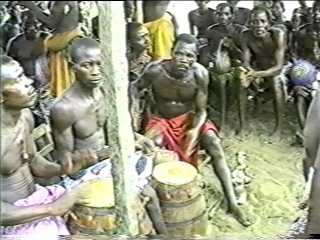

|
| University
of California At Berkeley African Music Ensemble – Music 148 Home Page CK Ladzekpo, Instructor |
Performance of West African music with particular emphasis on the music of Ghana. Practical instruction in traditional instrumental and vocal techniques.
Dance-drumming in sub-sahara African tradition is not only a fulfilling creative art, but also an ancient institution of learning and perhaps the nerve system in the development of the sub-saharan human infrastructure. Among its most important activities in implementing the sub-saharan collective agenda, it serves as an essential catalyst for articulating traditional praise-worthy attributes, manifesting them into images of life, putting them on display, and crowning them with glory for the elevation of participants as well as spectators. Dance-drumming, in a sub-sahara African tradition, is a drama of people performing well in life. A cursory glance through the annals of sub-saharan dance-drumming is not only a mere experience of some masterpieces of human creative art, but a fascinating adventure through essential dimensions of a civilization, its collective priorities, the skills of their implementation and the philosophies that inform them. In this course, we will examine the salient features of West African drum culture through discussions and practical performance.
You do not need a previous experience in African dance-drumming to do well in this course.
CK Ladzekpo
104 Morrison Hall
ladzekpo@berkeley.edu
Office Hours: By Appointment
Course number: Music 148
Course Control number: 60668P
Academic credit: 2 units
Credit option: Course may be repeated for credit
Course format: Four hours of rehearsal per week
Offered: Fall, Spring
Time: 2 - 4 PM Monday - Wednesday
Location: Hertz Hall, Music Department
Registration: Pre-registration and audition required. Enrollment is limited to 60 students.
Grading: Every student will participate in a group project. Each project group will rehearse, produce and perform a specific dance-drumming drawn from the repertoire covered in class during the semester. Final group project performances will be held at the last day of classes. Click here to see online presentation of some previous final group project performances. Final grades are computed from (a) project group performance — 30%, (b) class attendance — 50% and (c) competence in foundation rhythmic frameworks exercises — 20%.
(a), a popular secular dance-drumming tradition and
(b) Blekete, a divine dance-drumming ritual.

|
Click HERE for a video demonstration of the Kpanlogo Dance
|

|
Click HERE for a video demonstration of the Takada lead drum.
|

|
Click HERE for a video of Takada at the annual Spring Concert in 2006.
|
Gahu is a popular secular dance-drumming among the Anlo-Ewe people of southeastern Ghana. It originated among the Gun-Gbe people of Ketornu in Benin. It was later introduced in southwestern Nigeria where Anlo-Ewe migrant fishermen adapted it from their Nigerian hosts. Whether in Benin, Nigeria or Ghana, Gahu is a popular communal entertainment performed whenever the community finds the excuse to celebrate life.
Yeve is the most exalted and revered divinity among the Ewe people who reside in the modern West African countries of Ghana, Togo and Benin. Popularly known as a "God of Thunder," Yeve often uses the forces of thunder and lightening in revealing concerns and angers. Yeve religious sect is a secret society and all joining it have to undergo an intense period of instruction during which they learn a special divine language, "yevegbe," spoken only by members, exotic divine songs, dance-drumming and customs.
Sovu is Yeve divine dance-drumming, a rite of consecration or a medium of centering oneself in the divine spirit.

|
Click HERE for a video demonstration of the Sovu dance and drumming.
|
Entering puberty is a critical period of the ongoing communal assimilation of a child into the cultural tradition of society. The young child has developed the capability of reproducing sexually and must know the social responsibilities of that biological maturity.
Puberty rites known, as "dipo" is the communal forum in which the GaDangme female acquires the knowledge of the social responsibilities of this critical biological transition. Very respected female members of the community are the officiating elders. Their wisdom, life experience, self-esteem and self-confidence provide good role models for the young adults.
Tokoe is the dance-drumming performed at the beginning of the ceremonies to introduce the very carefully selected candidates of "dipo" to the community. Entering "dipo" is an honor and privilege and all entering must meet very strict qualification measures. Among these qualification measures is the requirement that the young adult remains a virgin by the time of entering.
The GaDangme people reside in southern Ghana along the banks of the Volta River

|
Click HERE for a video demonstration of the Atsia lead drum.
|

|
Click HERE for a video demonstration of the Atsia dance.
|

|
Click HERE for several video demonstrations of the Adzohu dance and drumming.
|

|
Click HERE for a video demonstration of Agbekor from the annual Spring Concert in 2006.
|
Email Inquiries: ladzekpo@berkeley.edu
C. K. Ladzekpo Home Page
African
Music And Dance Ensemble Home Page
Foundation
Course In African Dance-Drumming
Kpanlogo
Song Book
Kinka, An Anlo-Ewe Secular Dance-Drumming
Note: these pages are constantly under construction. We are always adding material about the music and culture of the Ewe and other African ethnic groups, along with related graphics, sound, and videos that you can download.
WebMastering
by
|
Email
Inquiries CK Ladzekpo Home Page |
and
Richard Hodges
|